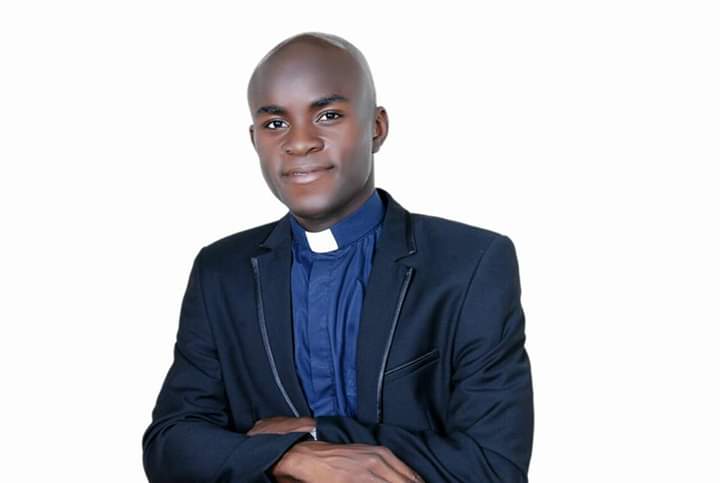Homilies & Reflections
Seventh Sunday Of Easter, Year C, By Rev. Fr. Lucas Binnah Junior, C.S.Sp
First Reading: Acts 7:55-60 / Responsorial Psalm: Psalm 97:1.2b.6.7c.9 (R. cf. 1a.9a) Second Reading: Revelation 22:12-14.16-17.20/Gospel Accl.: Jn. 14:18/Gospel: John 17:20-26
Theme: LIFE IN THE SPIRIT
A story is told of a man who was embarking on a very long journey. He told his family that he would keep long before returning. As if he was not going to come back again, he gave them his farewell speech that made his family to miss him already. Today, our Lord Jesus gives us his farewell speech in the form of an ardent prayer and wish, what has come to be called Jesus’ Priestly Prayer. By his Ascension, Jesus embarks on his journey to heaven where he came from. However, this is not an absence, but a renewed divine presence through the action of the Holy Spirit in the individual and community lives of his followers and those who will come to believe in him!
In the first reading which is St. Luke’s second volume work, the Acts of the Apostles narrates the passion of the proto-martyr, St. Stephen. In his martyrdom, God douses Stephen’s suffering by giving him a foretaste of the heavenly dwelling. As it were, God gives him the opportunity to see with his naked eyes, the glory and beauty of heaven, and not just that, he also experiences the beatific vision, so, Luke reports Stephen’s own words thus: “Behold, I see the heavens opened, and the Son of man standing at the right hand of God” (Acts 7:56). Jesus himself wishes us to see his glory and so prays in the Gospel: “Father, I want those you have given me to be with me where I am, so that they may always see the glory you have given me…” (Jn. 17:24).
By witnessing to the risen Lord, Stephen courts death, a charge taken as blasphemy, and its penalty, stoning to death (cf. Deut. 13:6ff). Yet, by this single act of Stephen, he reveals the one and only secret of his courage, namely Jesus, the Messiah. Thus, anyone who follows Christ more faithfully will have the power to face all situations including death, in peace and serenity. With Christ, life does not end in death but in resurrection. With Jesus, the excruciating pain and the seeming ‘cruci[1]humiliation’ of Good Friday, our sufferings, persecutions and troubles as Christians, if endured patiently and for the sake of Christ, will all give way to the lasting joy and peace of Easter Sunday!
Consequently, having encountered the beatific vision, all other things become inconsequential; all other ground is sinking sand if Christ is the rock on which we stand! To this end, Stephen simply commits his life into God’s hands when he prays: “Lord Jesus, receive my spirit” (Acts. 7:59). He is convinced that eternal life awaits him, and so, he asks the Lord to receive his spirit into this eternal bliss. We also need to live our lives in view of eternity, so that, we make heaven irrespective of the hatred, calumny, persecutions, trials and temptations we suffer in the Christian journey.
Again, there is another lesson to learn from Stephen. Even in his stoning, he is able to forgive all his enemies and murderers. He does not hold on to grudges; neither does he resort to vengeance and cursing, knowing too well that vengeance belongs to God (cf. Deut. 32: 35, Rom 12:19). He is not embittered, though, that is almost always the usual human disposition in such situations. Rather, he actually pities and has compassion on his persecutors. He wishes salvation for them and hence prays: “Lord, do not hold this sin against them” (Acts 7:60). Again, his life of prayer is instructive and reflects the lively, personal, intimate and warm relationship he has with God.
One big example we should all copy from Stephen, and as a matter of fact, do every day is to imitate Jesus in our daily lives. Stephen imitates Jesus so closely that he even dies doing what his master did and prays what his Saviour prayed during his own death on the cross (see Lk. 23:34). He forgives, and also commits his spirit to God. In our moments of pain, suffering and even death, we must not complain, sulk, fret, curse, insult and wish others worse conditions than our own. Such attitudes increase our pain and suffering. To have peace and serenity, we must imitate Christ.
Like the Psalmist, Stephen believes this about God: “For you indeed are the Lord most high above all the earth, exalted far above all gods” (Ps. 97:9). He knows that God is the “Alpha and Omega, the first and the last, the beginning and the end” (Rev. 22:13). Deep within his heart, he knows that dying as a witness for Jesus is highly rewarding. For this purpose, we are told: “Blessed are those who wash their robes, that they may have the right to the tree of life and that they may enter the city by the gates” (Rev. 22:14). Surely, our lives will never be in vain!
Also, it is worth noting that Stephen’s death contributes to the salvation of Saul (see Acts 8:1). Even though, Saul consents to killing Stephen, sooner than later, he converts to Christianity and becomes the apostle to the Gentiles. For this reason, St. Augustine says, “The Church owes Paul to the prayer of Stephen.” William Barclay corroborates this when he says: “However hard he tried, Saul could never forget the way in which Stephen had died. The blood of the martyrs even thus early had begun to be the seed of the Church.” This is possible when we live in the Spirit, and it is the effective prayer and the witness of a good life which changes people positively.
Furthermore, we must hasten the coming of Christ through repentance and conversion, effective witnessing and a passion to bring Christ to all those we meet. The Parousia, the Second Coming of Christ is real; it is what it actually is when we affirm in the Creed, “He will come again to judge the living and the dead.” For this reason, the second reading tells us: “Very soon now I shall be with you again, bringing the reward to be given to every man according to what he deserves” (Rev. 22:12) Until then, let us continue to pray: “Come, Lord Jesus” (Rev. 22:20).
Additionally, all who are ‘thirsty’ are invited to come to “the water of life, and have it free” (Rev. 22:17). This ‘water of life’ is the Holy Spirit, whom we are preparing to welcome at Pentecost. He is the Best Gift of God (cf. Lk. 11:13). He is God himself and who alone can satisfy our hunger and quench our thirst. With the Spirit, we are counselled, inspired, directed, taught, and protected for eternal life. This is what we see in the life of Stephen, a man full of faith and the Holy Spirit (cf. Acts 6:5). With the Holy Spirit, Christian life is not seen as a burden, but a loving service. We do not get tired because we simply cannot stop loving God over and over again!
So, how is this possible? Jesus teaches us that the solution to this insatiable thirst and hunger is practical union with God and with fellow humans through the Spirit. It is simply a life in the Spirit. Consequently, in the Gospel, we imagine a world very thirsty without God. To this end, Jesus prays: “…that they me all be one” (Jn. 17:21). The principle of unity and the water of life who will quench our ‘thirst’ is the Holy Spirit, the Love of God, of which Jesus rightly says: “…so that the love with which you loved me may be in them, and so that I may be in them” (Jn. 17:26). Our glory as children of God lies in our unity just as it exists in the Holy Trinity. By this, Jesus gives us a Trinitarian vision for our existence and we must keep this vision alive in our earthly relationships. The Spirit will help us as we desire, wait for and pray to him. May God strengthen us with his Holy Spirit as he did in the life of St. Stephen. May God bless his words in our hearts. Amen. Happy Sunday and may God richly bless us! Remember to live: #Life-In-The-Spirit#
Sharing is caring!
Ghana Catholic News aim to provide up to date news on the Catholic Church in Ghana on various disciplines such as diocese, priesthood, programs/events, promoting of the Catholic faith, daily readings, homilies, Catechism, etc.





